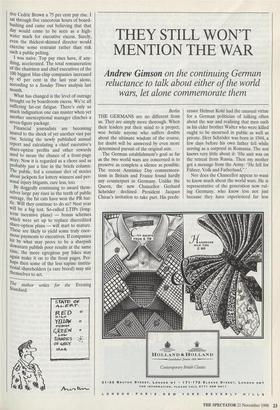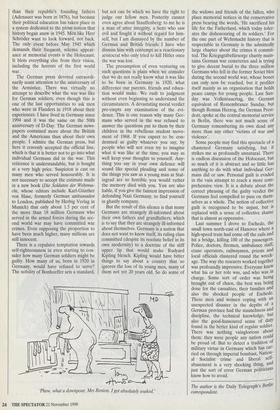THEY STILL WON'T MENTION THE WAR
Andrew Gimson on the continuing German reluctance to talk about either of the world wars, let alone commemorate them Berlin THE GERMANS are no different from us. They are simply more thorough. When their leaders put their mind to a project, woe betide anyone who suffers doubts about the ultimate wisdom of the course, for doubt will be answered by even more determined pursuit of the original aim.
The German establishment's goal as far as the two world wars are concerned is to preserve as complete a silence as possible. The recent Armistice Day commemora- tions in Britain and France found hardly any counterpart in Germany. Unlike the Queen, the new Chancellor Gerhard SchrOder declined President Jacques Chirac's invitation to take part. His prede- cessor Helmut Kohl had the unusual virtue for a German politician of talking often about the war and realising that men such as his elder brother Walter who were killed ought to be mourned in public as well as private. Herr Schroder was born in 1944, a few days before his own father fell while serving as a corporal in Romania. The son knows very little about it: 'His unit was on the retreat from Russia. Then my mother got a message from the Army: "He fell for Rihrer, Volk and Fatherland." ' Nor does the Chancellor appear to want to know much about the world wars. He is representative of the generation now rul- ing Germany, who know less not just because they have experienced far less than their republic's founding fathers (Adenauer was born in 1876), but because their political education has taken place in a system dedicated to the pious notion that history began anew in 1945. Men like Herr Schroder want to look forward, not back. The only event before May 1945 which demands their frequent, solemn appear- ance at memorial events is the Holocaust. It blots everything else from their vision, including the horrors of the first world war.
The German press devoted extraordi- narily scant attention to the anniversary of the Armistice. There was virtually no attempt to describe what the war was like for German soldiers, even though this is one of the last opportunities to ask men who were in Flanders in 1918 about their experiences. I have lived in Germany since 1994 and it was the same on the 50th anniversary of D-Day. The German news- papers contained more about the British and the Americans than about their own people. I admire the German press, but here it cravenly accepted the official line, which is that it is better not to go into what individual Germans did in the war. This reticence is understandable, but is bought at a very high price. Suspicion is cast on many men who served honourably. It is not necessary to accept the estimate made in a new book (Die Soldaten der Wehrma- cht, whose editors include Karl-Giinther von Hase, formerly German ambassador to London, published by Herbig Verlag in Munich) that only about 1.5 per cent of the more than 18 million Germans who served in the armed forces during the sec- ond world war may have committed war crimes. Even supposing the proportion to have been much higher, many millions are still innocent.
There is a repulsive temptation towards self-righteousness in even starting to con- sider how many German soldiers might be guilty. How many of us, born in 1920 in Germany, would have refused to serve? The nobility of Bonhoeffer sets a standard, but not one by which we have the right to judge our fellow men. Posterity cannot even agree about Stauffenberg: to me he is a man of utter integrity, a hero who saw evil and fought it without regard for him- self, but I am dismayed by the number of German and British friends I have who dismiss him with contempt as a reactionary aristocrat who only tried to kill Hitler once the war was lost.
The presumption of even venturing on such questions is plain when we consider that we do not really know what it was like to be born in Germany in 1920, what difference our parents, friends and educa- tion would make. We rush to judgment without even beginning to understand the circumstances. A devastating moral verdict pre-empts any examination of the evi- dence. This is one reason why many Ger- mans who served in the war refused to answer the questions put to them by their children in the rebellious student move- ment of 1968. If you expect to be con- demned as guilty whatever you say, by people who will not even try to imagine what it was like at the time, you may as well keep your thoughts to yourself. Any- thing you say in your own defence will sound like special pleading and some of the things you saw as a young man at Stal- ingrad are so horrible you would rather the memory died with you. You are also liable, if you give the faintest impression of defending Nazi Germany, to find yourself in ghastly company.
But the result of this silence is that many Germans are strangely ill-informed about their own fathers and grandfathers, which is to say that they are strangely ill-informed about themselves. Germany is a nation that does not want to know itself, its ruling class committed (despite its resolute belief in its own modernity) to a doctrine of the stiff upper lip that would make Rudyard Kipling blench. Kipling would have bitter things to say about a country that so ignores the loss of its young men, many of them not yet 20 years old. So do some of Phew, what a downpour, Mrs Renton. I got absolutely soaked.' the widows and friends of the fallen, who place memorial notices in the conservative press bearing the words, 'He sacrificed his life for the Fatherland, which today toler- ates the dishonouring of its soldiers.' For the one part of Wehrmacht history that is respectable in Germany is the admittedly large chapter about the crimes it commit- ted. The ICriegsgrabeffirsorge charity main- tains German war cemeteries and is trying to give decent burial to the three million Germans who fell in the former Soviet bloc during the second world war, whose bones can only now be reached, but it profiles itself mainly as an organisation that holds peace camps for young people. Last Sun- day was Volkstrauertag, the German equivalent of Remembrance Sunday, but though Roman Herzog, the German Presi- dent, spoke at the central memorial service in Berlin, there was not much sense of Germany remembering its own dead any more than any other 'victims of war and violence'.
Some people may find this spectacle of a chastened Germany satisfying, but it strikes me as profoundly unnatural. There is endless discussion of the Holocaust, but so much of it is abstract and so little has anything to do with what individual Ger- mans did or saw. Personal guilt is evaded in the vain attempt to reach a more com- prehensive view. It is a debate about the correct phrasing of the guilty verdict the Germans feel compelled to pass on them- selves as a whole. The notion of collective guilt is recognised to be unjust, but is replaced with a sense of collective shame that is almost as oppressive. Last summer I drove to Eschede, the small town north-east of Hanover where a high-speed train had come off the rails and hit a bridge, killing 100 of the passengers. Police, doctors, firemen, ambulance staff, crane operators, railwaymen, priests and local officials clustered round the wreck- age. The way the rescuers worked together was profoundly impressive. Everyone knew what his or her role was, and who was In charge. Some sort of order was being brought out of chaos, the best was being done for the casualties, their families and also the shocked people of Eschede. These men and women coping with an unexpected disaster in the depths of a German province had the staunchness and discipline, the technical knowledge, but also the good-humoured sense of duty found in the better kind of regular soldier. There was nothing vainglorious about them: they were people any nation could be proud of. But to detect a tradition of military virtue in Germany which has car- ried on through imperial bombast, Nation- al Socialist crime and liberal self- abasement is a very shocking thing, and just the sort of error German politicians know how to avoid.
The author is the Daily Telegraph's Berlin correspondent.



















































































 Previous page
Previous page